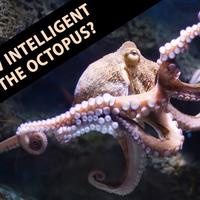Learn how intelligent the octopus is in 6 minutes! - YouTube
Neil: Hello and welcome to 6 Minute
English. I'm Neil.
Catherine: Hello. And I'm Catherine.
Neil: Now, Catherine, how do you feel
about cephalopods?
Catherine: Er ... cephalopods?
Neil: Yeah. You do know what
cephalopods are, don't you?
Catherine: Yes, of course I do. It's a new
kind of ipod, isn't it?
Neil: Not exactly, no. A cephalopod is a
kind of sea creature, like a squid or
octopus.
Catherine: Oh, cephalopods, yes, of
course. I know what a cephalopod is.
Neil: Of course you do. Well, today's
programme is all about one of these
squishy creatures,
the octopus, which apparently is a pretty
clever animal. To start, here's today's quiz
question. What is the correct plural form
of octopus? Is it:
a) octopuses, b) octopodes or c) octopi?
What do you think, Catherine?
Catherine: OK. I think this is a trick
question. I think people think that it's
'octopi', but it's actually,
there's a technical term for it, which is the
correct term and that's 'octopodes'.
But some people think, like children and
stuff, they just put the plural 's' on so they
say 'octopuses'.
So I'm going for answer b) octopodes.
Neil: Wow! Listen out for the answer at
the end of the programme, just to see
how right or wrong you are.
Now, apparently the octopus is a
remarkably intelligent creature.
They have the ability to solve some
complex problems and in one famous
case one was even
able to predict the result of World Cup
football matches.
Catherine: Oh yes, that was Paul the
octopus. I don't think he was really
psychic though. It was just a
publicity stunt by the zoo that had him,
as a way to promote their zoo.
Neil: It may have been a publicity stunt,
but he was actually quite accurate. In fact,
he correctly predicted the result of 12
matches out of 14 - that's 86%. Not bad, eh?
Catherine: That's amazing. I didn't know
he was that good. Anyway, Neil, tell us
some more about the octopus.
Neil: Well, I'll leave that to
Peter Godfrey-Smith, philosopher of
science and author of Other Minds: The
Octopus, the Sea, and the Deep Origins of
Consciousness. He is quite a fan
of our eight-tentacled friends. On the BBC
Radio 4 programme Start the Week he
said that
humans and the octopus have a common
ancestor. This is a term in science which
means a creature
from which both species evolved. Like a
very distant relative. How long ago does
he say this common ancestor lived?
Peter Godfrey-Smith: We got the octopus
as a very special evolutionary product. It's
an animal that's removed from us by a lot
of evolutionary distance. The common
ancestor that we share with an octopus
lived about 600 million years ago or
actually even a bit
longer than that. But it has a large
nervous system in a range comparable to
vertebrates.
Catherine: So our common ancestor lived
about 600 million years ago - or maybe a
little bit longer than that.
Neil: And he says that the octopus has a
nervous system that is comparable to
vertebrates. Comparable means similar
to, like, and vertebrates is the term for the
group of animals that
have a spine or backbone. We humans
are examples of vertebrates.
Catherine: So what Godfrey-Smith is
saying is that the squishy octopus has a
nervous system which has some
similarities to our own in that it's quite
large.
Neil: And a large nervous system is a sign
of intelligence. He goes on to talk a bit
more about how we might be able to
relate to the octopus. He talks about the
protean nature of its body.
Protean is an adjective which means
adaptable or changeable, and the
octopus's body is certainly that. Why
might that be a problem for us?
Peter Godfrey-Smith: The sensory world
of an octopus has, in some way it's
recognisable. They're very visual animals,
they're very taste-oriented animals and
those things make sense to us.
But the absence of hard parts, the
protean nature of the body and the sort
of extent of the sensitivity makes it a hard
thing to think about.
Catherine: This is interesting, isn't it?
So the octopus uses its senses of vision
and taste, like we do,
and this is something we can recognise,
but what is tricky for us is
that its form is so completely different
from ours. The octopus isn't a vertebrate
so it can change its
form and its shape very easily.
Neil: Yes, we're not used to thinking of
soft squishy things having intelligence.
And speaking of intelligence, we've been
very careful not to use the plural of
octopus so as not to
give away the answer to today's question
which was: what's the correct plural form?
a) octopuses, b) octopodes or c) octopi
Catherine, you said...
Catherine: Well, I said that some people
think it's 'octopuses', a lot of people think
it's 'octopi', but the actual answer is
'octopodes'.
Neil: And you're completely right.
Congratulations!
Catherine: Thank you. So let's review
today's vocabulary. Cephalopod is the
name of the group of
animals to which the octopus belongs.
Neil: A publicity stunt is something a
company might do to grab your attention
and promote its products.
Like claiming an octopus can
predict the winner of football matches.
Catherine: A common ancestor is a
distant relative from which two different
species evolved.
Neil: Comparable to means 'similar to' and
vertebrates are animals that have a spine.
Catherine: And then finally we had
protean, this adjective means 'adaptable
and changeable'.
Neil: Time now for us to say goodbye but
remember you can find us on Instagram,
Facebook, Twitter,
YouTube as well as our website,
So be sure to check us on one, several or
all of those before joining us again.
Goodbye.
Catherine: Bye!

